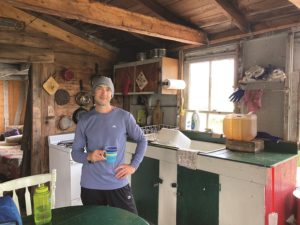Douglass Dineen received a new name in 2004: Fugan. It’s his “dharma name,” given by a Buddhist teacher to a newly ordained priest. In Zen teaching, fugan means “universal vow,” which refers to the first of the four bodhisattva vows: the vow to save all living creatures by helping them attain enlightenment. If that sounds difficult, it’s because it’s supposed to be.
“It’s impossible,” says Fugan, who now primarily uses his dharma name in both his work and his personal life. “It’s just one of those impossible tasks that can help set and maintain direction.”

Fugan wears many robes: Zen priest, professional musician, and ethnomusicologist. During the week of July 4, he and his partner, Amy Walenga (whose dharma name is Seijin), were residents at the C-Scape dune shack in Provincetown, just a few paces away from an altitudinous view of Race Point Beach.
The couple met in the Peace Corps 25 years ago. They were stationed together in Paraguay and shared an interest in meditation. They fell in love and spent time in the different sects of Buddhism before eventually landing on Sōtō Zen. Then, they were both ordained, becoming priest and nun.
For the last 12 years, Fugan and Amy have lived in Hyannis. Amy works as a nurse practitioner at Harbor Community Health Center, and Fugan does his music, teaching, and academic work. Together, they run Hyannis Zendo. Their small meditation group is just now resuming in-person sittings.
When we meet on the beach, Fugan is wearing a gray robe and black sun hat with earflaps over his shaved head. He emphasizes how thankful he was to spend time so close to nature. “It’s an unbelievable spot,” he says as we climb a steep path from the beach to the shack.
The C-Scape is one of two dune shacks managed by the Provincetown Community Compact and rented to guests who are selected by lottery. There are also subsidized programs allowing visual artists and writers to stay at the shacks for free. Fugan’s residency came via the writers’ program.
There are 19 dune shacks in the Peaked Hill Bars Historic District of the Cape Cod National Seashore. The shacks, with no heat, electricity, or running water, have an illustrious history of lodging writers and artists, including E.E. Cummings and Jackson Pollock.

Fugan is a serious percussionist, trained in several styles of traditional music. In the dune shack, he shows me some of his drums, including the Brazilian pandeiro, which he learned to play while living in Bahia, and the Indian mridangam, which figures into South Indian Carnatic music, the subject of his Ph.D. dissertation. He teaches a variety of instruments and their ethnomusicological origins at Boston College.
When the pandemic struck in 2020, his teaching continued online but gigs were harder to find. “The last year has been desolate, as you can imagine,” he says. “Playing out is just starting again.” He’s already lined up a series of gigs this summer on the Hyannis Village Green.
Fugan’s writing is intertwined with his life as a Zen priest. In a recent publication, he writes about the introduction of American Sign Language to a Zen temple in Manhattan. During an intensive meditation retreat in 2017, a deaf Zen priest named Ōshin Liam Jennings taught a group of practitioners how to manually sign the four bodhisattva vows. Many of these people, who were hearing (not deaf), reported to Fugan in interviews that signing was transforming their Zen practice. Physically embodying the vows felt “intuitive,” a natural addition to the traditionally strict set of forms that Zen priests observe.
His next article will focus on deaf communities that are being introduced to Zen, another collaboration with Ōshin, who now lives in Washington, D.C. and runs a Zen group at Gallaudet University. Fugan and Ōshin are also in the beginning stages of translating Buddhist sutras into American Sign Language.
American Sign Language has a lot of strengths, says Fugan, who admits that he’s still learning and finds it challenging. “It’s not a linear, one-dimensional language like English or phonetic script,” he says. “It’s multi-dimensional, and it doesn’t get stuck in time the same way that speaking and writing do.”
